'How Pokémon Go has changed my life'
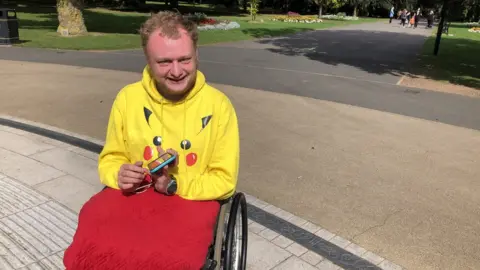 BBC
BBCPokémon Go was a record-breaking phenomenon when it launched in 2016, tempting gamers out of their homes to capture cute and colourful "creatures" outdoors. While some of its original players may have moved on to virtual pastures new, many others have continued to play, making it a permanent part of their lives.
'I'm reversing my diabetes'
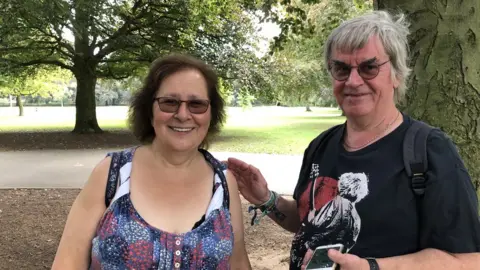
Retired couple Pauline and Robin Tarry, from Earlsdon, Coventry, go to some lengths to stalk their prey. They play Pokémon Go for up to five hours a day, walking about 30 miles (50km) a week, and regularly take part in so-called Community Days.
"We've been out at silly o'clock, we've been down the road at 1am to go in for a "Gym", so we've had extra exercise," said Mrs Tarry, 65.
Mr Tarry, who was diagnosed with diabetes five years ago, has lost three stone and is on the cusp of remission, which would mean stopping medication.
"My blood sugars are almost at pre-diagnosis level," added the 63-year-old. "I'm pleased but I can't get complacent."
The couple are now constantly on the look out for rare releases, even when on holiday.
"It was a Community Day... we were on a Greek ferry in the middle of the sea. We put "incense" on in the hope that we could catch something and we did," said Mrs Tarry, describing the mist players can activate to draw monsters out.
The hobby has introduced them to new friends, some of whom they met during "raids".
"We always have a social drink every Christmas. Last year there was some new Pokémon out and there were like 20 of us sitting in the pub and there was a new [creature] we could see in the distance," said Mr Tarry, a former English teacher.
"Everyone took their phones and left Pauline just guarding the drinks while they ran down. We caught the new one and then went back to the drinking."
What is Pokémon Go?
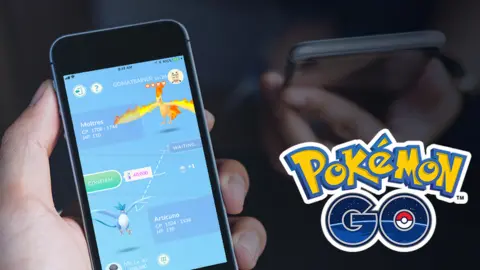 Niantic
Niantic- A phenomenon when launched in 2016, Pokémon Go generated more than £1bn in revenue in its first year, say creators Niantic Labs
- Players search real world maps to find virtual creatures appearing nearby, then physically go out to "capture" them
- Users can also take Pokémon into battle in "raids" against others at "Gyms"; uncover Poké Balls and eggs at PokéStops, and hatch and train new creatures
- The game-makers say the app was created to encourage "healthy outdoor exploration and social game play"
- Community Days encourage users to get out and play together in local parks for a few hours each month
'Now I want to go out'
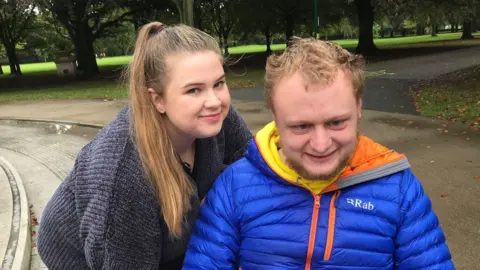
Matthew Gibson, the proud collector of more than 500 Pikachu soft toys, "didn't want to go out much" before Pokémon Go launched.
"I was like, 'mum it's a bit windy,'... or, 'mum it's a bit rainy,'... I didn't even want to go out in the sun because there was nothing to do," said 26-year-old Mr Gibson, who has cerebral palsy and autism.
But he was "fantastically excited" when the game was released and says it has led him to places he would never have explored otherwise.
"I've [found] things in my neighbourhood that I didn't know were there. I even go to places like the parks and the castles so I can do Pokémon while mum and dad are looking around."
Mr Gibson's support worker Millie Knight has helped him set up a club at Drapers Bar and Kitchen in Coventry, where disabled gamers can meet once a month and swap trading cards.
"Quite a few people with autism like Pokémon... it's a nice environment, we turn the music down and people can either play together or play separately," said Ms Knight.
"It does help people go out in the community. It's just a really social thing."
'I can play with my grandson again'
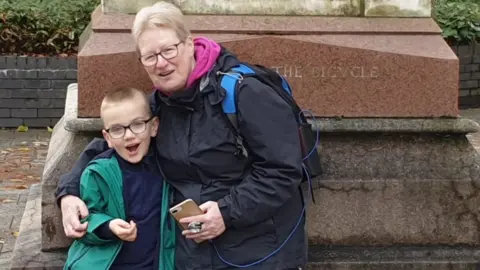 Lesley Morgan
Lesley MorganA year ago, Lesley Morgan would struggle to play with her six-year-old grandson, Sam, because she was "full of aches and pains."
Then the youngster twisted her arm to download Pokémon Go when he stayed at her house on the outskirts of Coventry for the weekend.
"[At first] I couldn't catch a thing," said the 65-year-old council IT worker. "Now it's me saying to him 'come on let's go and do this'."
With the added bonus of a PokéStop two doors from her house, the gaming habit soon became "very regular" for Ms Morgan.
Rewards for travelling long distances motivated her to start walking to work, catching Pokémon en-route. She began clocking up more than 30 miles (50km) a week and reducing her dependence on an inhaler.
"My asthma nurse is so pleased I've got lungs again. I can run for the bus and not feel like I'm going to die. I've also gone down about two dress sizes."
Sam is now the one she has to persuade to keep playing.
"Sometimes when he's with me he can walk up to 6 miles (10km). He says, 'Grandma can we go home now? You're walking my feet off.'"
You may also be interested in:
'It gave us new friends'
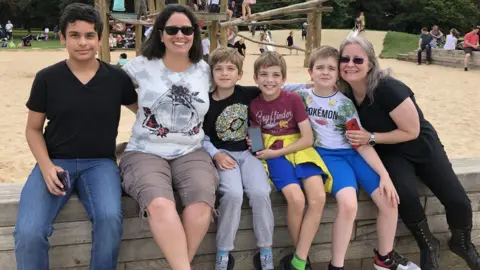
"I never expected that I would meet other people through playing this game," says Shawnna Pomeroy, who moved to her husband's native West Midlands from California five years ago.
She initially started hunting Pokémon with her nine-year-old old twin boys and 14-year-old step-son "to get the kids out and off iPads". But the Coventry University worker's own love for the game soon took over.
"I was visiting my parents in the States once and I saw a dragonite nearby which is pretty rare... it's like I was more embarrassed about going out to catch a Pokémon than if I had been doing a drug deal," she joked.
During a Community Day in Coventry she and her sons met the Sindon family. Her boys later pestered her to catch up again with their new friend, Milo, but realised they hadn't swapped numbers.
"We found their house on Google maps and knocked on the door - since then we have been fast friends," said Mrs Pomeroy.
"There are friends outside of Pokémon that really lead on to something special," added Rebecca Sindon.

Follow BBC West Midlands on Facebook, on Twitter, and sign up for local news updates direct to your phone.
